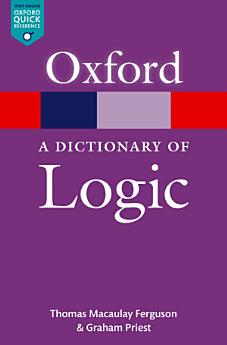A Dictionary of Logic
yun 2016 · Oxford University Press
4,2star
5 avisreport
E-book
64
Pages
family_home
Éligible
info
reportLes notes et avis ne sont pas vérifiés. En savoir plus
À propos de cet e-book
A Dictionary of Logic expands on Oxford's coverage of the topic in works such as The Oxford Dictionary of Philosophy, The Concise Oxford Dictionary of Mathematics, and A Dictionary of Computer Science. Featuring more than 450 entries primarily concentrating on technical terminology, the history of logic, the foundations of mathematics, and non-classical logic, this dictionary is an essential resource for both undergraduates and postgraduates studying philosophical logic at a high level.
Notes et avis
4,2
5 avis
À propos de l'auteur
Thomas Macaulay Ferguson is a doctoral candidate in philosophy at the CUNY Graduate Center. His primary interest is philosophical logic, with focuses on many-valued model theory, paraconsistent logic, and the logical work of William Parry. His work has appeared in Notre Dame Journal of Formal Logic, Studia Logica, Journal of Philosophical Logic, Journal of Logic and Computation, and Logica Universalis. Graham Priest is Distinguished Professor of Philosophy at the CUNY Graduate Center, and a regular visitor at the University of Melbourne and at St. Andrews University. He is well known for his work on non-classical logic, and its application to metaphysics and the history of philosophy. His publications include One: Being an Investigation into the Unity of Reality and of its Parts, including the Singular Object which is Nothingness (2014, OUP) and A Very Short Introduction to Logic (2000, OUP).
Donner une note à cet e-book
Dites-nous ce que vous en pensez.
Informations sur la lecture
Smartphones et tablettes
Installez l'application Google Play Livres pour Android et iPad ou iPhone. Elle se synchronise automatiquement avec votre compte et vous permet de lire des livres en ligne ou hors connexion, où que vous soyez.
Ordinateurs portables et de bureau
Vous pouvez écouter les livres audio achetés sur Google Play à l'aide du navigateur Web de votre ordinateur.
Liseuses et autres appareils
Pour lire sur des appareils e-Ink, comme les liseuses Kobo, vous devez télécharger un fichier et le transférer sur l'appareil en question. Suivez les instructions détaillées du Centre d'aide pour transférer les fichiers sur les liseuses compatibles.






